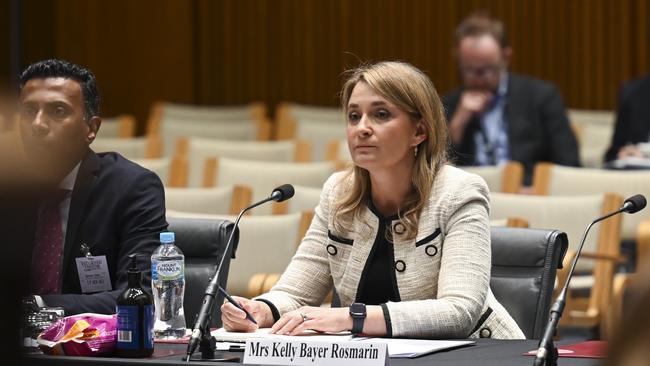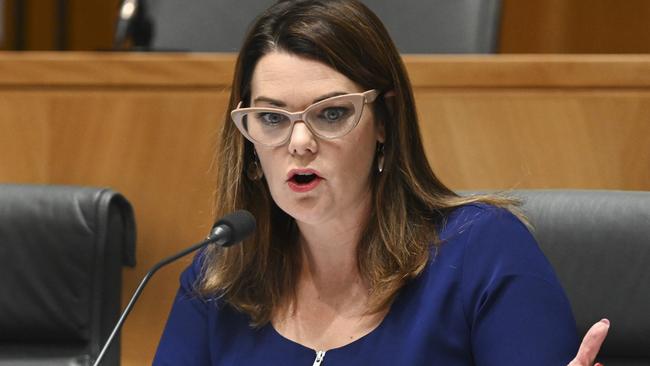Optus did not foresee outage risk, defends Triple-0 failure as CEO faces pressure to resign
Kelly Bayer Rosmarin says her team ‘did the best they could’ but did not plan for the risk of a nationwide outage like last week’s, despite the threat for telcos.

Optus chief executive Kelly Bayer Rosmarin admitted the troubled telco had no plan to combat a catastrophic nationwide outage and conceded she was in the dark to the extent of the crisis until more than 3½ hours after the network collapsed last week.
Ms Bayer Rosmarin is facing mounting pressure to resign after outage cut off more than 10 million Australians from phone and internet services – including the ability to call triple-0. It is Optus’s second reputational disaster under her leadership following last year’s cyber attack.
But Ms Bayer Rosmarin fended off questions about her futureat a Senate inquiry on Friday, saying that her “focus is on the team, the customers, the community”.
The inquiry capped off a week of blame games, including Optus fingering its Singapore government-controlled owner Singtel, which “triggered” the outage following a “routine upgrade”.
Facing fiery questioning from senators who branded Ms Bayer Rosmarin’s communications as “very lousy” and “fluffy”, she revealed that Optus had not planned for an outage of last week’s scale.
She also said she was in the dark as to the extent of the shut down until she arrived at Optus’s office in Sydney at 7.35am, more than 3½ hours after Optus’s network collapsed, wreaking widespread economic disruption.
“We did not have an articulated clear risk that each one of our 90 routers will independently shut itself down at the same time,” she said.
Optus managing director networks Lambo Kanagaratnam, who appeared with Ms Bayer Rosmarin at the inquiry, said it completed an outage drill last month, but it focused on a shutdown in WA, not the entire country.
“We didn’t have a plan in place for that specific scale of outage. It was unexpected. We have high levels of redundancy and it’s not something that we expect to happen,” Mr Kanagaratnam said.
“It is certainly something that we commit to learning from this outage and we will take such exercises in the future.”
Optus now faces a compensation bill of up to $400m, according to Asian bank Maybank, with some small businesses reporting losses of up to $10,000.
Ms Bayer Rosmarin told senators that Optus had so far paid $36,000 in compensation claims but warned against seeking damages for “consequential loss”, saying it could have far-reaching consequences – even for government agencies. “There is no precedent for telcos or other essential providers covering consequential loss, and we are very conscious that this would have far-reaching implications not just for Optus, not just for all telcos including the NBN, but also for other essential services, utilities, government services,” she said.
“I don’t like to use the word compensation because what we’re doing is assessing this specific scenario of that customer and trying to do the right thing by their customer who we want to have a long-term relationship with us.”

More than 200 Australians could not dial triple-0 for emergency services during the outage. But Ms Bayer Rosmarin said Optus was not entirely to blame, calling for broader reform of the telecommunications industry.
“We don’t manage the triple-0 system. It’s a very complex system that involves all the carriers,” she said.
“It involves the device manufacturers. The triple-0 system is supposed to be able to pick up the traffic when we have an outage like this. The triple-0 system itself should have helped our customers during outage and we will take accountability for any role we’ve had in that but there are also probably changes that need to be made in other parts of that system, potentially with different devices.”
Telco industry insiders rejected Ms Rosmarin’s comments, saying the triple-0 system didn’t fail; Optus’s capability to link to it did.
Ms Bayer Rosmarin said on the morning of the outage she was not aware that Australians could not dial triple-0 for emergency services on fixed lines. But one telco insider said this was symptomatic of an “internal management error” in which network staff didn’t relay the problem to the executive and crisis management meetings.
Inquiry chair Sarah Hanson-Young asked Ms Bayer Rosmarin if Optus communications and crisis management teams needed an overhaul.
The Optus chief said there were “always opportunities for us to do better” but she “wholeheartedly believed that the team did the best they could”.
“We will be taking all of that feedback on board to try and make sure that we do better in the future, whilst at the same time trying to make sure there is no future where that’s needed.”
Ms Bayer Rosmarin defended the length of time it took her to front the media, which was about seven hours after the meltdown, and angered Communications Minister Michelle Rowland, who felt she needed to step in and fill the void.
“Some have criticised me for not appearing publicly sooner. The key reason for this was twofold. Firstly, I prioritise the team’s actual crisis response,” she said.
“Most importantly, we needed to identify if the outage was a result of malicious or ongoing attack. This was critical to ensure we could re-establish the network safely.”
Ms Bayer Rosmarin said it was a “strange coincidence” that Optus’s network collapsed when the entire board of Singtel was in Australia. The last time directors were in Australia was when a cyber attack hit Optus in September last year and she said the company wanted to rule out similar malicious activity.
“It took the team until 10.20am to be able to confirm that (wasn’t the case), but it was a very serious concern for us in those hours up until 10.20am,” she said.
More Coverage







To join the conversation, please log in. Don't have an account? Register
Join the conversation, you are commenting as Logout